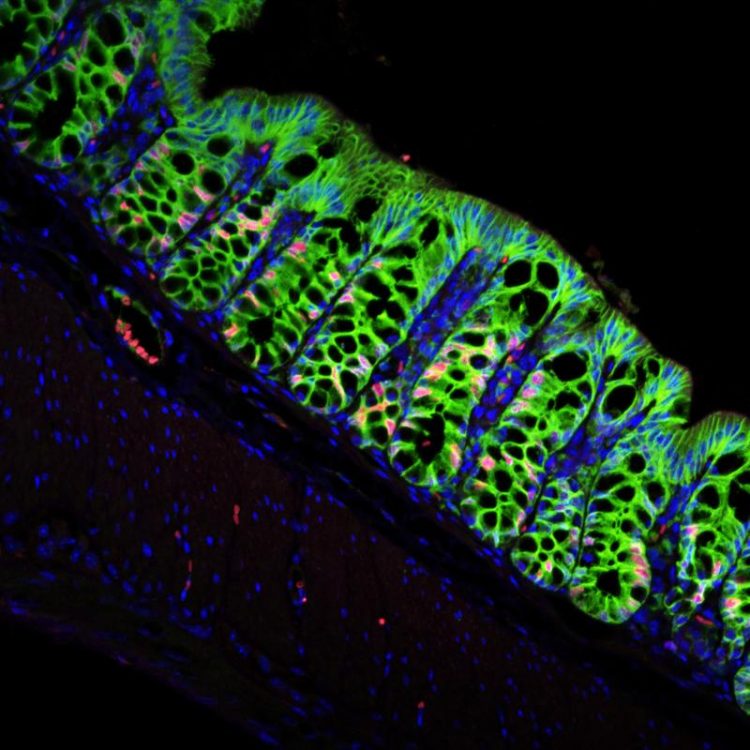Stem-Cell Niche for 10 Billion Colon Cells a Day

Colon of a mouse with normal stem cell niche Bahar Degirmenci, UZH
The human intestine constantly renews itself. Alone in the colon – the last 1.5 meters of the gastrointestinal tract – 10 billion epithelial cells are replaced each day. The intestinal epithelium is the layer of cells that forms the lining of both the small and large intestine and is responsible for absorbing nutrients.
The regeneration process is driven by stem cells that are found in small folds of the epithelium (crypts), where they are in contact with other cells that produce the signals needed to drive regeneration. The key activating signal that sustains the stem cells is called “Wnt”.
Colon stem cells perish without signaling
A group of UZH researchers, including Konrad Basler from the Institute of Molecular Life Sciences, have now discovered the cells responsible for providing the activating signal to the stem cells. These so-called Gli1-positive cells surround the crypts in the epithelium and thereby form the stem-cell niche.
The scientists performed studies in mice to demonstrate that these cells play an essential role in forming and repairing the intestinal epithelium. “If the Gli1-positive cells are eliminated or unable to secrete Wnt proteins, the activation signal is lost. Consequently the colon’s stem cells as well as the epithelium will perish, and the organism dies,” says Basler.
Long-term constant activation leads to colon cancer
Just how critical a well-balanced regulation of the intestinal epithelium is also becomes evident when stem cells are driven to constantly divide. If Wnt signaling is stimulated excessively, the stem cells divide in an uncontrolled manner. “Mice with mutations in the Wnt signaling pathways develop polyps, from which colon cancer later develops,” adds the molecular biologist. This is also the case for humans.
Niche cells are also responsible for tissue repair
In further tests, the researchers examined the behavior of the cells in the stem-cell niche in response to inflammation of the colon. In this situation, many more epithelial cells are lost than in healthy animals. The need for new cells is therefore greater, since the tissue not only has to be maintained but also repaired. The researchers observed that the amount of Gli1-positive cells increased significantly in response to an inflamed colon.
“The cells we’ve discovered are thus not only essential for healthy organisms, but are also essential when it comes to repairing a damaged intestinal epithelium,” says Basler. The discovery and description of the colon’s stem-cell niche therefore has relevance for a whole string of intestinal diseases, from inflammation to cancer.
Literature:
Bahar Degirmenci, Tomas Valenta, Slavica Dimitrieva-Janeva, George Hausmann, Konrad Basler. GLI1-expressing mesenchymal cells form the essential Wnt-secreting niche for colon stem cells. Nature. June 6, 2018. doi: 10.1038/s41586-018-0190-3
Contact:
Prof. Konrad Basler, PhD
Institute of Molecular Life Sciences
University of Zurich
Phone +41 44 635 31 10
E-mail: konrad.basler@imls.uzh.ch
http://www.media.uzh.ch/en/Press-Releases/2018/colon-stem-cell-niche.html
Media Contact
All latest news from the category: Life Sciences and Chemistry
Articles and reports from the Life Sciences and chemistry area deal with applied and basic research into modern biology, chemistry and human medicine.
Valuable information can be found on a range of life sciences fields including bacteriology, biochemistry, bionics, bioinformatics, biophysics, biotechnology, genetics, geobotany, human biology, marine biology, microbiology, molecular biology, cellular biology, zoology, bioinorganic chemistry, microchemistry and environmental chemistry.
Newest articles

First-of-its-kind study uses remote sensing to monitor plastic debris in rivers and lakes
Remote sensing creates a cost-effective solution to monitoring plastic pollution. A first-of-its-kind study from researchers at the University of Minnesota Twin Cities shows how remote sensing can help monitor and…

Laser-based artificial neuron mimics nerve cell functions at lightning speed
With a processing speed a billion times faster than nature, chip-based laser neuron could help advance AI tasks such as pattern recognition and sequence prediction. Researchers have developed a laser-based…

Optimising the processing of plastic waste
Just one look in the yellow bin reveals a colourful jumble of different types of plastic. However, the purer and more uniform plastic waste is, the easier it is to…



